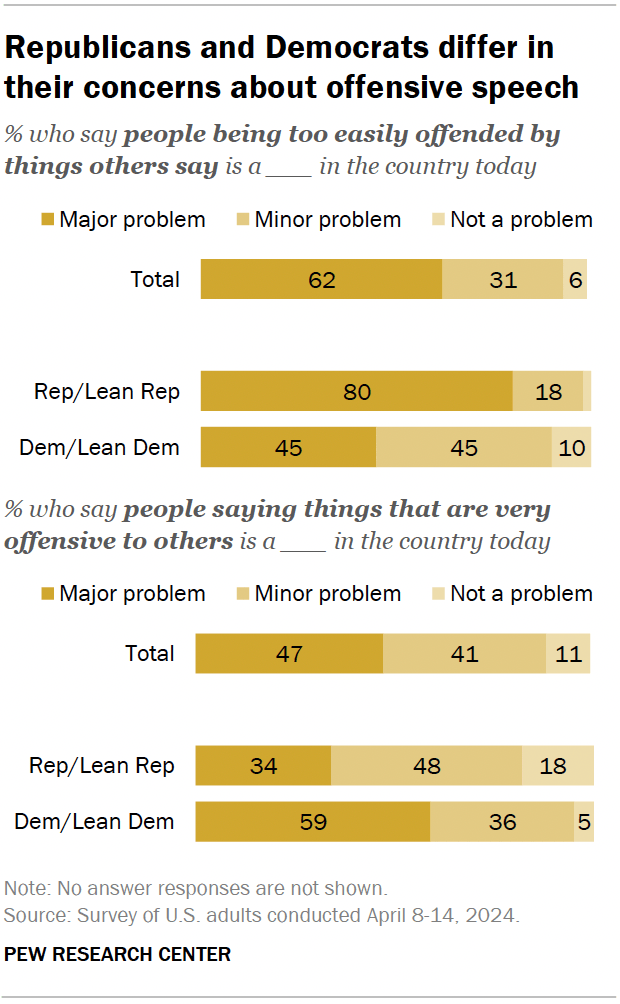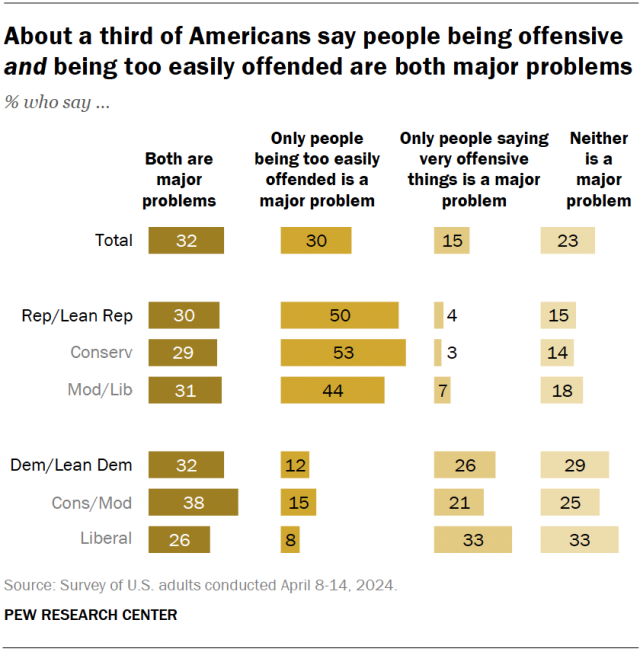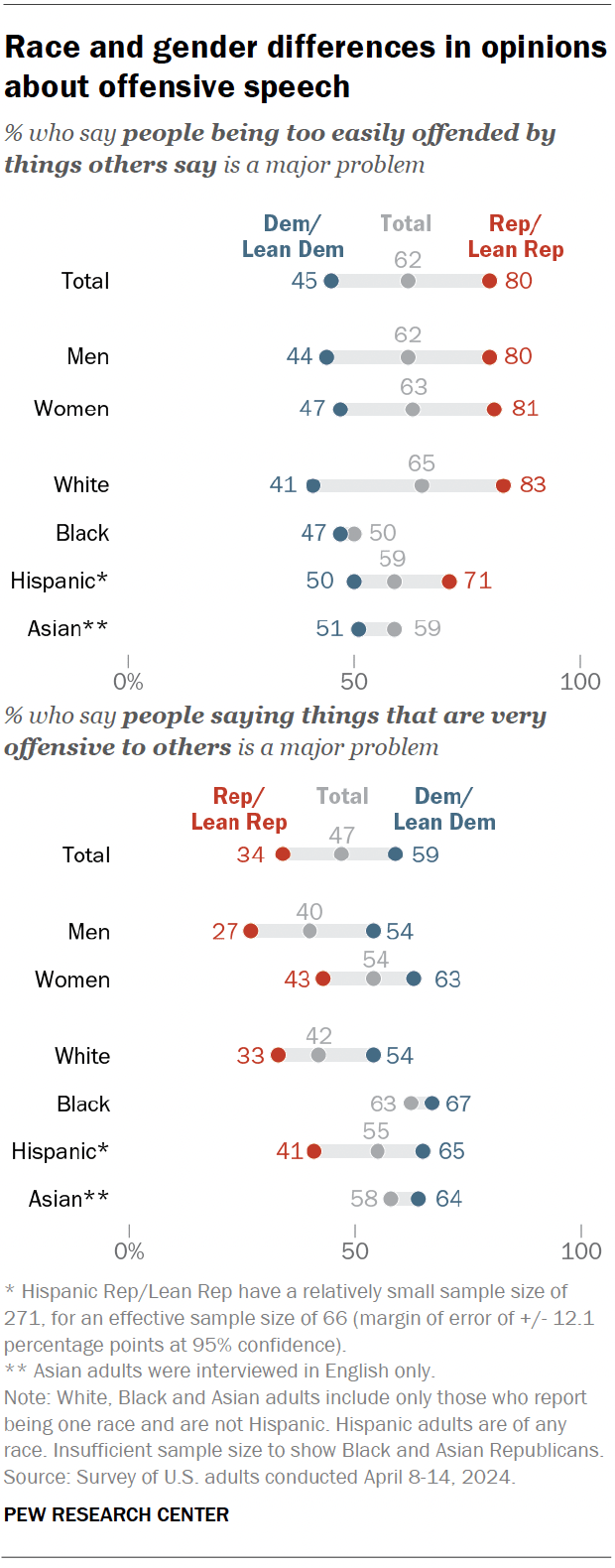About six-in-ten U.S. adults (62%) say that “people being too easily offended by things others say” is a major problem in the country today.
In a separate question, 47% say that “people saying things that are very offensive to others” is a major problem, according to a Pew Research Center survey conducted in April.
Pew Research Center conducted this analysis to understand Americans’ views on whether offensive speech – and people being too easily offended by what others say – are major problems for the country. For this analysis, we surveyed 8,709 U.S. adults from April 8 to 14, 2024.
Everyone who took part in this survey is a member of the Center’s American Trends Panel (ATP), an online survey panel that is recruited through national, random sampling of residential addresses. This way nearly all U.S. adults have a chance of selection. The survey is weighted to be representative of the U.S. adult population by gender, race, ethnicity, partisan affiliation, education and other categories. Read more about the ATP’s methodology. Here are the questions used for this analysis, along with responses, and its methodology.

There are substantial differences in these views between Republicans and Democrats.
- Eight-in-ten Republicans and Republican-leaning independents say people being too easily offended by what others say is a major problem. By comparison, 45% of Democrats and Democratic leaners say the same.
- In contrast, Democrats are more likely than Republicans to say that people saying things that are very offensive is a major problem in the country today. A 59% majority of Democrats say this, compared with 34% of Republicans.
Looking at Americans’ views on these two questions together, about a third (32%) say that people being too easily offended by things others say and people saying very offensive things to others are both major problems.

About as many Americans (30%) say people taking offense too easily is a major problem, but very offensive speech is not. A much smaller share (15%) say that people saying very offensive things is a major problem, but people too easily taking offense isn’t. And another 23% say that neither is a major problem in the country.
Sizable shares within both parties say both issues are major problems – 30% of Republicans and 32% of Democrats say this.
However, half of Republicans, compared with just 12% of Democrats, say people being too easily offended is a major problem, but people saying very offensive things isn’t. Slightly more than half of conservative Republicans (53%) hold this combination of views, along with 44% of moderate and liberal Republicans.
By contrast, about a quarter of Democrats (26%) – and a third of liberal Democrats – say people saying very offensive things is a major problem, but people being too easily offended is not. Just 4% of Republicans hold this combination of views.
Another 29% of Democrats, but just 15% of Republicans, say neither of these is a major problem.
There are also significant demographic differences in attitudes about offensive speech.
Race and ethnicity

While at least half of Americans across racial and ethnic groups say being too easily offended is a major problem in the country, White adults are particularly likely to say this. Nearly two-thirds of White adults (65%) say this is a major problem, as do 59% of Hispanic, 59% of Asian and 50% of Black adults.
No more than about one-in-ten in any of these groups say people getting offended too easily is not a problem in the country today.
Conversely, Black (63%), Asian (58%) and Hispanic (55%) adults are more likely than White adults (42%) to say that people saying very offensive things to others is a major problem.
Gender
Men (62%) and women (63%) are about equally likely to say people being too easily offended is a major problem.
But women (54%) are far more likely than men (40%) to say offensive speech is a major problem.
Within political parties, there are some differences by gender, race and ethnicity on these questions.
On whether people being too easily offended is a major problem:
- Hispanic Republicans (71%) are less likely than White Republicans (83%) to say this is a major problem. (The sample size for Black and Asian Republicans is too small to evaluate these groups individually.)
- There are no gaps between men and women in either party.
On whether offensive speech is a major problem:
- Democratic and Republican women are more likely than men in their parties to say offensive speech is a major problem. Among Democrats, 63% of women and 54% of men say this. And in the GOP, 43% of women and 27% of men say the same.
- While roughly two-thirds of Black (67%), Hispanic (65%) and Asian Democrats (64%) say this is a major issue, a narrower majority of White Democrats (54%) share that view.
Note: This is an update of a post originally published Dec. 14, 2021. Here are the questions used for this analysis, along with responses, and its methodology.
